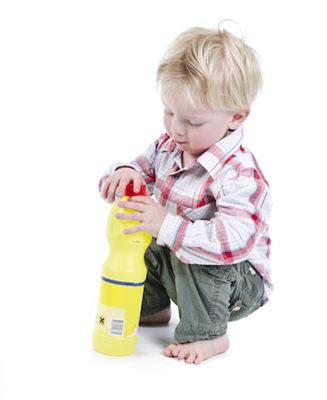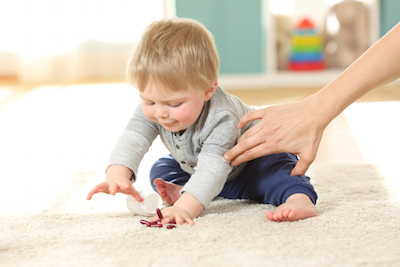How to prevent accidental poisoning in your home
One million children in the U.S. under the age of six years will suffer from some type of poisoning this year. Exposure to toxic substances can occur in the home, at school, at a grandparent’s or friend’s house- anywhere your little ones can roam. These unfortunate events tend to happen when a parent or caregiver is with a child, but not necessarily paying close attention.
Common dangers in the home
 Some of the most likely culprits for poisoning are the things stored or used every day in your home. Personal care products, over-the-counter medication and household cleaners top the list of most common ingestions by toddlers and preschoolers.
Some of the most likely culprits for poisoning are the things stored or used every day in your home. Personal care products, over-the-counter medication and household cleaners top the list of most common ingestions by toddlers and preschoolers.
The most dangerous potential poisons, according to the American Academy of Pediatrics (AAP), are as follows:
- Medicines
- Cleaning products
- Liquid nicotine
- Antifreeze
- Windshield wiper fluid
- Pesticides
- Furniture polish
- Gasoline
- Kerosene or lamp oil
Ways to prevent poisoning in your home
Pediatricians and Poison Control experts recommend the following precautions:
- Store medications (including over-the-counter drugs) in a locked cabinet or out of reach of children. Keep in mind, though, that when unsupervised children can likely climb better and farther than you might think them capable.
- Check your bathroom drawers, your nightstand, your clothes pockets, your desk or anywhere you wouldn’t think your children would know you kept medicine but they could get to if you weren’t looking.
 Store personal care products such as toothpaste, shampoo or soap out of reach.
Store personal care products such as toothpaste, shampoo or soap out of reach. - Secure your purse and personal belongings where children cannot get into them.
- Don’t take medicine in front of small children, as they may want to imitate you.
- Never refer to medicine as candy. It’s tempting when trying to get a child to take medicine they need, but this teaches a dangerous lesson.
- Always ask for child-proof caps for prescription medications, but recognize that children can sometimes get them open.
- Keep medications in their own container with child-proof lids. Remember that child-resistant is not the same as child-proof.
- Store household products such as cleaners and detergents out of reach or in a child-proof locked cabinet.
- It’s best to use traditional powder or liquid laundry detergent (rather than single-use laundry pods) when you have small children as laundry pods are a considerable risk.
- Keep alcohol in a locked cabinet.
- Store hazardous items in the garage in a locked shed or out of reach.
- If you use e-cigarettes, keep the liquid nicotine cartridges in a locked cabinet.
- Never store hazardous substances in containers that resemble food or drink containers. Keep hazardous substances in original containers and out of reach.
What to do if a poisoning occurs
If your child is unconscious, not breathing, having convulsions or a seizure due to a poison ingestion, call 9-1-1 and seek medical help immediately.
If you believe your child may have come into contact with a poison, but the child is not presently showing any symptoms or the symptoms are mild, call Poison Help at 1-800-222-1222.
The experts at Poison Control Centers are highly trained to help you identify the substance that may have been ingested, determine the risk to your child, instruct you in the immediate steps you must take to help your child and inform you whether your child needs emergency treatment or other non-emergent medical care. Poison Centers are open 24 hours a day, 7 days a week, including holidays.
Do everything you can to prevent a poisoning from happening to your little ones, but be prepared in case the unthinkable happens.










